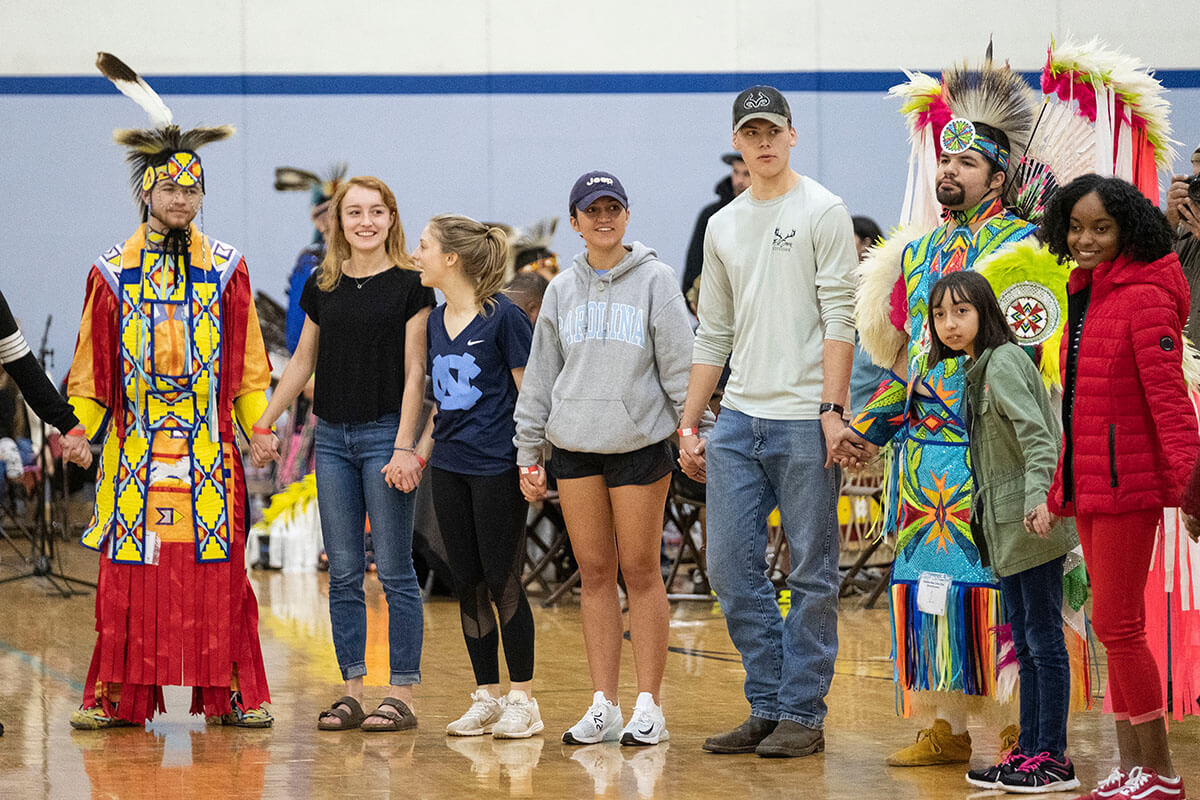
To others, it may seem like a small thing. But an incoming phone call from a tribal leader to Carolina’s American Indian Center (AIC) is a big deal, says Randi Byrd, the center’s community engagement coordinator.
“When they come to us as a resource, we know they trust us to extend a listening ear that comes with the support, guidance and connections they need to be in a stronger position to address their community needs and self-determined priorities for their respective nations,” she says.
North Carolina has the largest American Indian population on the east coast, with eight recognized tribes and four urban Indian organizations. The AIC is a public service center at Carolina that operates on values traditionally found in Native communities such as respect, responsibility, reciprocity and balance. The genesis of the center’s service to others lies in those values, says Byrd.
“Tribes are sovereign nations, so we meet them where they are as a partner, from a place of respect that is culturally appropriate and affirming. When our support helps them meet the goals they’ve defined for themselves, we know we have been successful in our mission,” she says.
The AIC was established in 2006 to advance the University’s missions of research, education and service by positioning Carolina as a leading public university for American Indian scholarship and scholars and making Native issues a permanent part of the intellectual life of the University.
For a center with a small staff of just five employees, they offer an immense range of support to Native students and surrounding communities. Engaging North Carolina’s tribal communities through various initiatives is a major part of the center’s role in public service.
“We want to strengthen them, meet their needs and build their capacity,” says Larry Chavis, associate professor of strategy and entrepreneurship at the UNC Kenan-Flagler Business School and interim director of the center. “When tribes need help, we can connect them with resources here at Carolina, help them apply for grants or find grants we can award to them. We also try to help researchers here at the University engage in research with our communities in culturally relevant ways. If you’re studying diabetes, are you including Native communities? We are a resource for that.”
Byrd, who has been at AIC for 10 years, coordinates one of the center’s largest programs, Healthy Native North Carolinians Network, which addresses physical, mental, emotional, and spiritual wellbeing in Native communities. She works with all tribes and urban Indian organizations in the state, at varying levels, to support their self-determined health and wellness programs with methods that value indigenous ways of knowing and practices.
“Our support helps those communities design their own health and wellness activities or strengthen community-driven projects that are already underway. We can help bring in resources, but they decide how to use them. This program is a good model for the way you can and should engage with tribal nations, from governments to partners to universities.”
On campus, the AIC provides financial and administrative support to the Carolina Indian Circle, provides opportunities for work study students (AIC Ambassadors) and graduate student interns, gives small monetary awards to students and offers guidance on working in professional environments. Some students have been able to find internship opportunities within their tribes through AIC’s initiatives in their communities. The center also engages and provides support to students in the First Nations Graduate Circle, Native American Law Students Association, Alpha Pi Omega Sorority and the Phi Sigma Nu Fraternity.
The AIC is the only university-based American Indian public service center in the state and Southeast. Each summer, it hosts Carolina Horizons, a four-day residential, student enrichment program designed to support American Indian students as they prepare to apply to college. It’s also a ‘home away from home,’ for students in Native communities, a safe cultural space that affirms their identify and provides opportunities to engage with heritage.
“We want to be a nurturing place. Any big university can be a hard place to be a little different. Students engaged with us have graduation rates around 90 percent, which is well above the campus average,” says Chavis.
Though the AIC has been in a period transformation, with interim leadership and a move to a new building on Wilson Street off Cameron Avenue, the students have continued to benefit from generous support, says Chavis.
“We’re in a great position, and we have a lot of things to look forward to. We’re reevaluating the best ways to help the Native community here at UNC and across the state. Our outlook is bright.”
Help secure the future of the American Indian Center by making a gift today.

